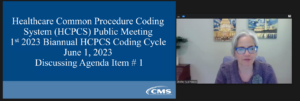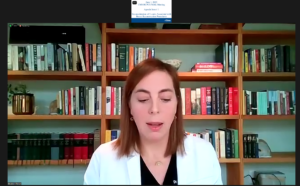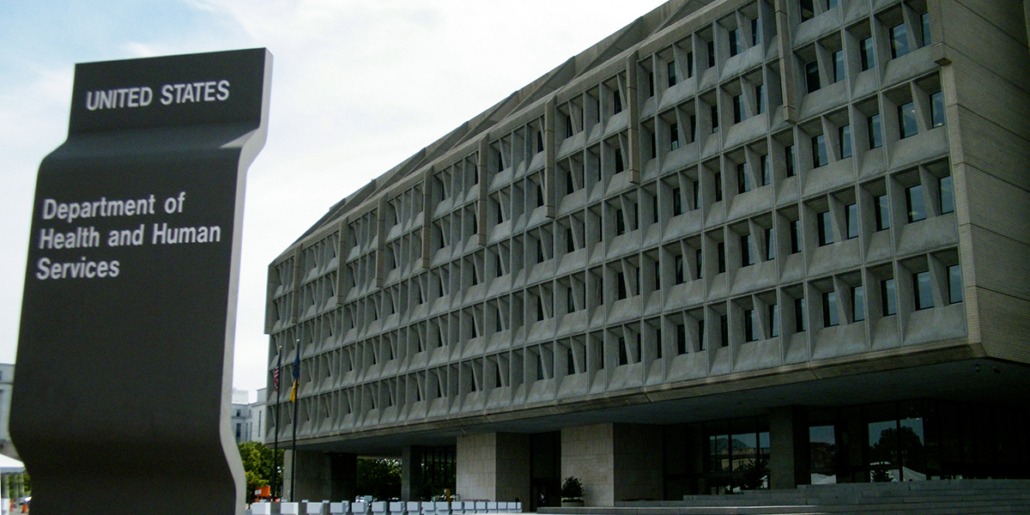NCCS Urges CMS to Preserve Access to DIEP Flap Breast Reconstruction
Today, the Centers for Medicare and Medicaid Services (CMS) hosted a public meeting, in which they sought input on its decision to sunset the S code for deep inferior epigastric perforator (DIEP) flap reconstruction. NCCS has engaged in advocacy, along with other patient advocacy organizations and health care providers, to encourage CMS to reinstate the codes. The decision to end the S codes at the end of 2024 has created access issues for people in need of DIEP flap reconstruction. NCCS CEO Shelley Fuld Nasso spoke at the public meeting and provided the following comments:
Read the full letter below, or download the letter here.
SHELLEY FULD NASSO, NCCS CEO, PROVIDES COMMENT DURING CMS PUBLIC MEETING
June 1, 2023
Comments for Healthcare Common Procedure Coding System (HCPCS) Public Meeting

Shelley Fuld Nasso provides comments urging CMS to preserve access to DIEP Flap breast reconstruction.
My name is Shelley Fuld Nasso, and I am the CEO of the National Coalition for Cancer Survivorship. I have no financial disclosures. NCCS is a patient advocacy organization with the mission to advocate for quality cancer care for everyone touched by cancer.
NCCS asks CMS to retain the S codes for breast reconstruction, so that people in need of breast reconstruction have access to DIEP flap procedures. DIEP flap is an important reconstruction option for individuals who choose reconstruction with their own tissue, rather than breast implants. The decision to end the S codes at the end of 2024 created access issues for people in need of DIEP flap reconstruction. The patients we represent report that DIEP flap is increasingly not an option for them. Many are simply no longer offered the option of DIEP flap surgery. Those who learn about DIEP flap may have difficulty finding a surgeon willing to accept the rate of payment for code 19364. Of course, women who can pay out of pocket will still have access to DIEP flap, exacerbating disparities in access to care. But no one who has faced cancer should have to pay out of pocket for breast reconstruction.

Dr. Elisabeth Potter, board certified plastic surgeon, provides comments to CMS regarding DIEP Flap breast reconstruction access for breast cancer patients.
The access issues following the decision to eliminate the S codes have illustrated the lack of input by patients and patient advocates, as well as inadequate consideration for patient outcomes in coding decisions. Without the S codes, the 19364 CPT code for autologous reconstruction equates two procedures, DIEP flap and TRAM flap, that are absolutely NOT equal from the patient perspective. The TRAM flap is easier on surgeons, but harder on patients. The DIEP flap is a more complex procedure, but is better for patients, as it spares the muscle and allows for better recovery and long-term quality of life. Patient advocates were not part of the decision-making process. As advocates for patients, we weigh in on coverage and reimbursement issues because we know that, in our health care system, what is paid for gets done, and without adequate payment for physicians, patients will not receive the services they need. Most patient advocacy organizations, even ones that work on public policy, coverage, and reimbursement issues, do not have the staff resources to follow and weigh in on every public meeting in which coding decisions are discussed. Given its strategic pillars to Advance Equity and Engage Partners, CMS should proactively engage patients and patient advocates to weigh in on decisions that have implications on access to care and on decisions that have the potential to widen disparities.
We need to make it easy to do the right thing, and hard to do the wrong thing. Right now, the payment structure for breast reconstruction is the exact opposite, incentivizing surgeons to provide implants or an inferior procedure or cosmetic surgery, rather than the reconstruction that breast cancer patients need and deserve. You have heard from microsurgeons how this change has made it harder, or impossible, to provide the care patients deserve. Retaining the S codes will make it easier for surgeons to do the right thing for their patients who want reconstruction using their own tissue.
Finally, retaining the S codes would honor the Cancer Moonshot goals of helping “patients and families have the best experience possible while living with and surviving cancer, and to improve patient outcomes.”
# # #





